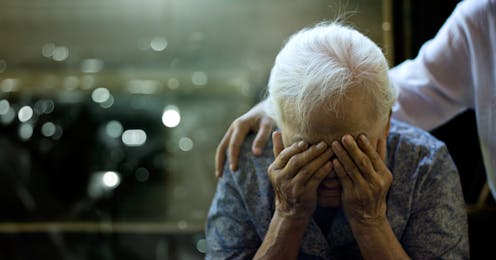What is 'sundowning' and why does it happen to many people with dementia?
- Written by Steve Macfarlane, Head of Clinical Services, Dementia Support Australia, & Associate Professor of Psychiatry, Monash University

The term “sundowning[1]” is sometimes used to describe a tendency for people living with dementia to become more confused in the late afternoon and into the night.
At the outset, I should emphasise the term “sundowning” is overly simplistic, as it’s a shorthand term that can encompass a vast number of behaviours in many different contexts. When assessing changed behaviours in dementia, it’s always better to hear a full and accurate description of what the person is actually doing at these times, rather than to just accept that “they’re sundowning.”
This set of behaviours commonly described as “sundowning” often includes (but is not limited to) confusion, anxiety, agitation, pacing and “shadowing” others. It may look different depending on the stage of dementia, the person’s personality and past behaviour patterns, and the presence of specific triggers.
Why then, do such altered behaviours tend to happen at specific times of the day? And what should you do when it happens to your loved one?
Read more: When someone living with dementia is distressed or violent, 'de-escalation' is vital[2]
Fading light
We all interpret the world via the information that enters our brains through our five senses. Chief among these are sight and sound.
Imagine the difficulty you’d have if asked to perform a complex task while in a darkened room.
People living with dementia are just as dependent on sensory input to make sense of and correctly interpret their environment.
As light fades[3] towards the end of the day, so too does the amount of sensory input available to help a dementia patient interpret the world.
The impact[4] of this on a brain struggling to integrate sensory information at the best of times can be significant, resulting in increased confusion and unexpected behaviours.
Read more: Serving up choice and dignity in aged care – how meals are enjoyed is about more than what's on the plate[5]
Cognitive exhaustion
We have all heard it said that we only use a fraction our brain power, and it is true we all have far more brain power than we typically require for most of the day’s mundane tasks.
This “cognitive reserve” can be brought to bear when we are faced with complex or stressful tasks that require more mental effort. But what if you just don’t have much cognitive reserve?
The changes that ultimately lead to symptoms of Alzheimer’s disease can begin to develop for as many as 30 years[6] before the onset of symptoms.
During that time, in simple terms, the condition eats away at our cognitive reserve.
It is only when the damage done is so significant our brains can no longer compensate for it that we develop the first symptoms of Alzheimer’s disease and other dementias.
So by the time someone first presents with very early dementia symptoms, a lot of damage has already been done. Cognitive reserve has been lost, and the symptoms of memory loss finally become apparent.
As a result, people living with dementia are required to exert far more mental effort during the course of a routine day than most of us.
We have all felt cognitively exhausted, run down and perhaps somewhat irritable after a long day doing a difficult task that has consumed an extreme amount of mental effort and concentration.
Those living with dementia are required to exert similar amounts of mental effort just to get through their daytime routine.
So is it any surprise that after several hours of concerted mental effort just to get by (often in an unfamiliar place), people tend to get cognitively exhausted[7]?
What should I do if it happens to my loved one?
The homes of people living with dementia should be well-lit[10] in the late afternoons and evenings when the sun is going down to help the person with dementia integrate and interpret sensory input.
A short nap[11] after lunch may help alleviate cognitive fatigue towards the end of the day. It gives the brain, and along with it a person’s resilience, an opportunity to “recharge”.
However, there is no substitute for a fuller assessment of the other causes that might contribute to altered behaviour.
Unmet needs[12] such as hunger or thirst, the presence of pain, depression, boredom or loneliness can all contribute, as can stimulants such as caffeine or sugar being given too late in the day.
The behaviours too often described by the overly simplistic term “sundowning” are complex and their causes are often highly individual and interrelated. As is often the case in medicine, a particular set of symptoms is often best managed by better understanding the root causes.
Read more: These 12 things can reduce your dementia risk – but many Australians don't know them all[13]
References
- ^ sundowning (www.nia.nih.gov)
- ^ When someone living with dementia is distressed or violent, 'de-escalation' is vital (theconversation.com)
- ^ light fades (www.medicalnewstoday.com)
- ^ impact (www.medicalnewstoday.com)
- ^ Serving up choice and dignity in aged care – how meals are enjoyed is about more than what's on the plate (theconversation.com)
- ^ 30 years (www.ncbi.nlm.nih.gov)
- ^ cognitively exhausted (www.alz.org)
- ^ Pexels/cottonbro studio (www.pexels.com)
- ^ CC BY (creativecommons.org)
- ^ well-lit (onlinelibrary.wiley.com)
- ^ short nap (www.nia.nih.gov)
- ^ Unmet needs (www.alzheimers.org.uk)
- ^ These 12 things can reduce your dementia risk – but many Australians don't know them all (theconversation.com)

















